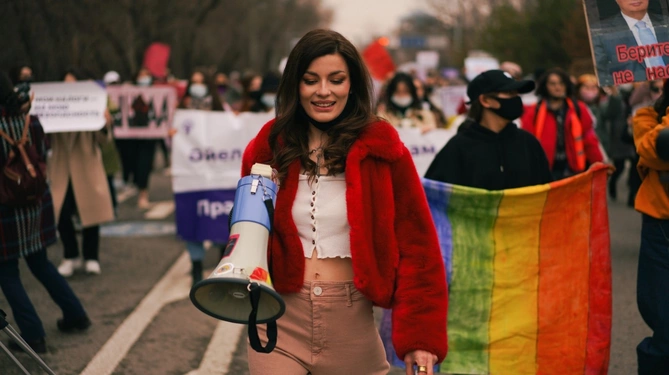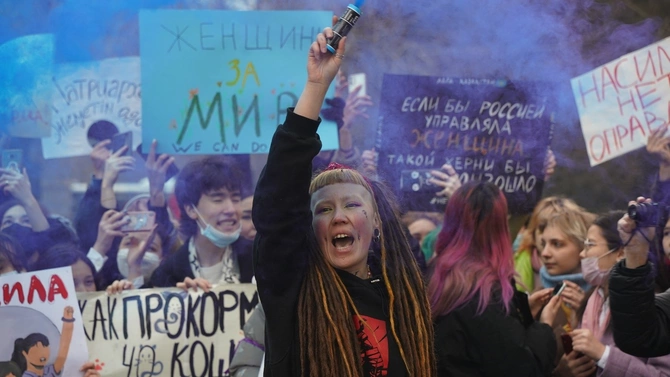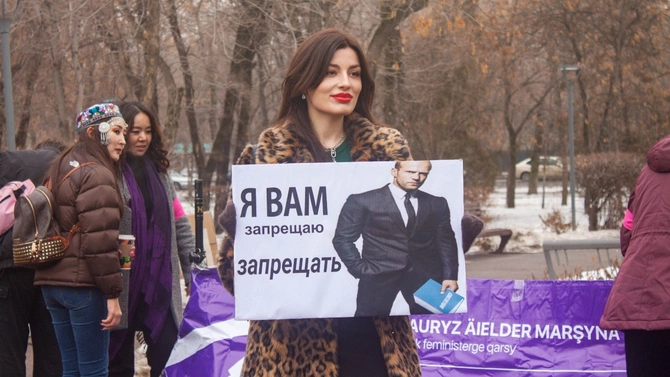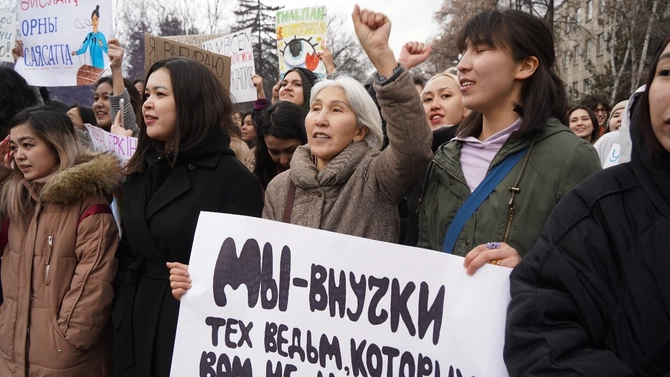
Leila Mekhdiyeva interviews Veronica Fonova, a 30-year-old graphic designer and feminist activist in Kazakhstan. She is the co-founder of KazFem, has participated in the UN Women’s Conference, and established a reliable source on domestic violence statistics.
Image: Veronica Fonova
In post-Soviet countries, women are afraid to be called feminists or perceived as such due to the stigma that it is something to be ashamed of. Many times when a woman says something that represents feminist values, for example, that women deserve to get paid as much as men, or that women can decide what to do with their bodies without anybody’s permission, they often follow it with “but I am not a feminist, of course!” The number of women who understand the importance and benefits of feminism in the lives of all women and are not ashamed to call themselves feminists is small but in no way insignificant. Veronica Fonova, one of the leading voices in the feminist movement in Kazakhstan, is a living example of that.
Fonova’s feminism started with her eating disorder. “It’s awkward to talk about it even now,” she says as she opens up about one of the scariest periods in her life. She suffered from bulimia from the age of 18 to 24. Not knowing who to ask for help, she suffered silently and blamed herself.

One day she stumbled upon a body positivity movement online. She remembers initially feeling sorry for people who accepted themselves and their bodies and refused to be on a diet to love themselves. Yet she kept returning to those groups and reading more stories of women who overcame their eating disorders.
That was when she read a book by Naomi Wolf, The Beauty Myth, which changed her life. Fonova remembers: “With this book started my healing and my coming to feminism. I felt anger that made me move forward.” She realized that the patriarchy was the reason why there are so many expectations for women: “A woman must work full-time, be successful at work, be able to do everything at home, look great, serve everyone emotionally, always be nice, shouldn’t get angry or lose her temper, should take care of herself, but in no way should she ask for someone to pay for her because she has to earn a lot of money. This is some kind of mockery, it's unreal!”
Realizing the unfair and harsh reality that women face in a patriarchal society wasn’t enough. Fonova decided to take real action to help younger girls, who were seeing “these photoshopped bodies on Instagram, in commercials, and on the internet,” and refused to let them suffer both physically and mentally the way she did.
Soon Fonova started finding other women with similar beliefs and views. She joined a leftist socialist group hoping to speak her mind and take action to battle the patriarchy. However, soon it became clear that the group wasn’t serious about women’s rights believing that “once class problems will be solved, so will women’s.” Women in the group didn’t have a chance to speak up and discuss women’s rights issues. So in the summer of 2015, together with her friends, Fonova co-founded KazFem.
Today KazFem is an initiative led by feminist activists. “It does not belong to anyone, it is not limited by anything. Each of us has our own work, our own field of activity,” Fonova explains. Today they are mainly focused on organizing rallies and marches on International Women’s Day in Almaty. “This is a cool, huge civic initiative that brought together lawyers, human rights activists, and just women who find it interesting and important.”
In recent years, news about feminist marches in Kazakhstan has become more common. However, this year’s Women’s March in Almaty could not have become a reality if it weren’t for the resilience and determination of KazFem activists, along with demonstrations and demands for the government to allow the feminist march to be held. The chronology of the marches is not linear. From the beginning, it was a challenge even to get permission from city officials to hold the march or demonstrations in support of women’s rights. In September 2017 KazFem held its first Women’s Rights March in Almaty. Together with just 20 people, they marched through Arbat (Almaty’s main pedestrian street) with a five-meter-long banner. However, because the march was not sanctioned (every demonstration, protest, or march in Kazakhstan must be sanctioned i.e., approved by the government), the next day Fonova received a phone call asking her to come to the mayor’s office. “It seemed alarming, but there were no official measures [taken]. We had a ‘preventive conversation,’ saying next time [we would need to] send the request for the march.”
The first sanctioned march was only approved two years later. In 2019 after receiving 36 requests on behalf of KazFem, the government officials finally gave up and allowed the march to be held on March 8. From 2020 onwards, Women’s Rights Marches have been held annually in Almaty, yet behind the scenes, the battle between the government and feminists was far from finished. The last two annual marches were harder to get approved and Fonova confesses that she is not sure that next year anything will happen at all, as the government’s resistance and threats to ban everything are demotivating. “In 2021, we thought that this was our legal right [because] we showed that there are many of us and it is peaceful without incidents. But no.”

As I listen to Fonova’s story, I can’t help but wonder: “Why is Kazakhstan’s government so afraid of feminists? What harm could women demanding better laws protecting them do?” She explains that the government is caught in the crossfire between feminists and right-wing activists. The latter are those who are “against the law on domestic violence, who believe that parents should decide whether to beat a child or not and that it is normal to beat a child. Those who are against juvenile justice, against the state interfering in the affairs of the family, and anti-vaxxers,” Fonova clarifies. Despite the following and support from the like-minded citizens that KazFem has, she suspects that the government wouldn’t want to upset the other side. “Maybe our government sees a more targeted audience of those who adhere to ‘strong values.’ Maybe they think that they will be more useful in the future than we, feminists, who are for freedom of reproductive choice and are against violence.”
Interestingly enough, KazFem activists are not against the other side going out to the streets and expressing their views even if they oppose theirs. Fonova believes that it shows the current state of affairs in the country.
However, confrontations don’t just end on the street. KazFem activists have been exposed to online bullying from the beginning of their activism. In 2015-16 in response to their marches, nasty and hateful comments calling KazFem activists “fat, bow-legged, and ugly” were commonly used by trolls online. Fonova remembers that in response to them opposing sexual harassment against women, people would go as far as to say, “No one will even rape you, why are you against violence?”
Then there was another phase that went beyond bullying online. In 2017-18, Fonova realized that she was now under surveillance. One day after work her mother called her saying that a few police officers had come to her mother’s house looking for the activist. Fonova was then taken to the police department to talk about her activism.
The next time, two police officers came to her on the morning of March 8, 2018. They asked what her plans for the day were, and when she said that she had no plans, they showed her a screenshot from her private chat on Facebook, saying, “But here's the chat.” “It was creepy. I felt uncomfortable”, Fonova remembers. Although now she treats it with humour, saying that if they are still reading her private messages, she at least hopes they laugh at her memes.
One of the recent instances of bullying online was a video of some right-wing commentator demonizing feminists and women’s rights marches in Kazakhstan and demanding MMA fighters oppose feminists. Despite it all, Fonova remains optimistic about her future due to the overwhelming support she receives from her friends, colleagues, and acquaintances, and prefers not to think about such negative cases.

In 2020 Fonova was interviewed by UN Women and invited to their conference on the elimination of violence and discrimination against women in Bangkok. It happened after Fonova published a post on her Facebook page, revealing that she quit her previous job at an advertising agency due to sexual objectification that she had witnessed there. “My boss at that time crossed all acceptable boundaries. There were many episodes where he offered me and my colleague to take nude photos. I worked for this company for a very long time, I loved it, and everything was great,” she says. The final straw was when they made a poster of an advertising manager wearing nothing but underwear and covering herself with a notebook to advertise their services. Fonova, as a graphic designer, was asked to add writing, to which she refused, stating that it was unacceptable for an advertising agency. “We provide advertising services, services in the field of design, why should we advertise naked employees? It was with her consent, [yet] it was humiliating for all female employees of the company. He said it was none of my business. I resigned the same day.”
Her Facebook post became so popular that Fonova’s ex-employer called her, threatening to go to court if she wouldn’t delete it. “I consulted with a lawyer in the current company, who said since there are no names and titles, everything is fine. Do not delete, do not answer, just block and that's it.” Unfortunately, the majority of her former colleagues sided with their boss and blamed Fonova for escalating the issue. That didn’t scare Fonova: “I thought that we should talk about this because, at that time, it was 2019, such topics were not particularly raised.” Luckily, thanks to her bravery to speak out against the sexualization of female employees, she got invited to the UN Women’s panel.
Although Fonova witnessed inappropriate behaviour at her workplace, she mainly focuses on criminalizing domestic abuse in Kazakhstan. The lack of better laws protecting women from abuse started with then-President of Kazakhstan Nursultan Nazarbayev signing amendments to the criminal code in July 2017. It decriminalized “battery” and “intentional infliction of light bodily harm” articles that are used to prosecute domestic violence cases. According to Human Rights Watch, authorities in Kazakhstan are not only “neither adequately preventing violence nor holding abusers accountable”, they instead “often encourage them to drop their complaints and reconcile with their abusers.”
“The only thing I would like is one day for this law (that would criminalize domestic violence) to be adopted… and to come up with mechanisms in the civil society that would help monitor the implementation of this law. So that it is not just on paper like criminal articles are now, but that it actually works.”

Her own family history was affected by domestic abuse. Fonova’s grandmother moved from Ukraine to Kazakhstan to escape her husband’s abuse. Fonova confesses that opening up about it gave her grandmother “validation of her experience” as she was gaslighted and told that it was the norm and everyone lived with it. “All the brothers-in-law were doing it to their wives. There were worse stories. Although when she tells me her story, I don’t know what could be worse.” Finding out about her grandmother’s experience gave Fonova the energy and knowledge to continue and to do more. That’s how her personal project dedicated to her grandmother was born.
Schitaetsya.kz is a project with official statistics about domestic violence in Kazakhstan. As Fonova explains, her goal was to create a website with detailed data, as at the time, there was “a vague figure from the UN Women about 500 deaths per year.” She had to request official information from the prosecutor’s office and was shocked to find out that “statistics from the prosecutor's office and the Ministry of Internal Affairs are not even close to what is happening in reality.” She clarifies that “these statistics are not meant to reflect reality, it is for activists, journalists and understanding how poorly our courts, police, and prosecutors work.”
Fonova shares that as the project is still young, she has plans for its future and for it to be more useful for women going through domestic abuse and violence. She also hopes to grow her team, as now it only consists of her and her two friends. Currently, the website is available only in Russian, its Kazakh version is in progress.
Fonova shares that it’s hard to make plans for the future regarding her feminist activism due to the government suppressing the movement. “Every year, I plan to quit it. Every time after a big demonstration I say that I can’t anymore. It affects my nervous system and exhausts me,” she says. “It’s sad when you do these things, and every year you put more effort, learn from the mistakes of past years, try to take into account every moment, and there are already more people and resources, and you still hit the wall.” Yet her optimism always wins: “Each time closer to the date, I say no, I can't quit it.”
Today it is possible to join KazFem and help in different ways. All you need to do is to write them a personal message. However, as Fonova states, you don’t have to be part of KazFem to talk and write about these issues as “any support and publicity help.”
When it comes to those who don’t support KazFem and feminism, Fonova says that she doesn’t like to “divide people into groups.” She believes that Kazakh society has fallen victim to the current state of politics and economy. She doesn’t blame those who have no time to care about some “lofty goals” when many people live below the poverty line, wondering whether they will be able to afford “clothes and food for their children,” or if they will even have a place to live in tomorrow. Fonova believes that first “it is necessary to overcome corruption,” so people can focus on social issues and reforms “rather than [try to] survive.”
Share on social media